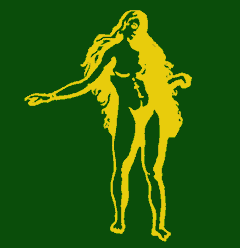Eve, Original Sin or Lost Innocence ?
nifedipine er
acheter nifedipine
10 citalopram 20mg
citalopram
20mg mixing adderall and weed
mixing weed and adderall
click here tadalafil generico sandoz
cialis generico
costo Eve is the image of earthy innocence in the Garden so many seem eager to rediscover.
The temptation of the serpent is Kabbalistically recognised as the spirit of Daath, Knowledge on the Tree of Life. This is the spirit of Sagittarius, the spirit of Pluto. It is the irresistible urge to learn, to experience the consequences of our own actions so we know what's what. The finest ideal of knowledge. Primeval innocence is all very well but we will not evolve as God wants us to, evolve into Self conscious gods and His partners in Creation, unless we learn the lessons of life the hard way.
This is why God put the serpent in the heart of the Garden, in temptation's way, with the forbidden fruit of the knowledge of good and evil, so closely tied to carnal knowledge. We needed to learn the lesson of blind lust which made the first parents cover their nakedness. Eventually we will instinctively distinguish between good and evil, between life-giving love and love-denying, destructive lust. Not crudely, simplistically, but pragmatically, intelligently, with the clear, tolerant insight of experience. The great mystic poet, William Blake, baldly declared in his Songs of Innocence and Experience, 'the lust of the goat is the bounty of God.'
Unfortunately the debate is currently being led by men definitively inexperienced in these matters, the clergy of the Catholic church, whose spiritual ideals are matched by their worldly denials. The litany of dire carnal catastrophes, not least among the Catholic clergy themselves, eloquently testify the untenable tension this doctrinal division inevitably engenders : if we try to cleverly separate the spirit and the flesh, we're asking for disaster.
Generally jealousy of the pleasures of others, from which one is excluded, is the natural reaction in questions of the flesh. The Catholic clergy are above reproach and this is ever and anon an irresistible licence for the corruption which (theologically) flesh inherits from Adam : the temptation to be natural, the temptation to make mistakes. The temptation not to listen but to learn the hard way, like Adam.
If the high-minded spiritual ideals of the Church are hardened by a lack of the generous spirit of tolerance because this heirarchy lack natural fulfillment in their own lives, this would be only human. If their views are distorted by by their lack of knowledge, their lack of practical insight into the difference between good and evil, between love, just learning and unjustifiable lust, they would be only human. If their views are confused by the confessional where they hear tales only of carnal failings, always as a sin, ever as lust, never as the love which is all that keeps our human world turning, this would be natural.
If their views are coloured above all by the sacred interests of Holy Mother Church, her integrity, history and official Infallibility, this too is only human. If they lacked self-sacrificing courage and followed their founder, St Peter, who denied Christ for his own interests, his own preservation, they would be only too human and it would be unrealistic to expect more.
It is good to recognise 'the great and good' have all-too-human hearts, minds and the rest because ever and anon our respect has been betrayed, power has corrupted with the sway of interests not those of the people but of the institutions and heirarchies which claim to serve them but serve themselves first, naturally.
Perhaps supporting Blake's view, Genesis helpfully points out this forbidden fruit bestows divine qualities : 'And the Lord God said, Behold, the man is become as one of us, to know good and evil ....' (Ch.3 v.22)
This voyage of discovery, finding ourselves and discovering all that makes us human, we owe it all to our first mother. Before we even begin to recognise the heavenly elevation of womankind represented by the Assumption of Mary which theologically represents Eve redeemed. It also represents the redemption of Holy Mother Church, for after all, 'to err is human, to forgive divine.'
These notes are not complete or final.


